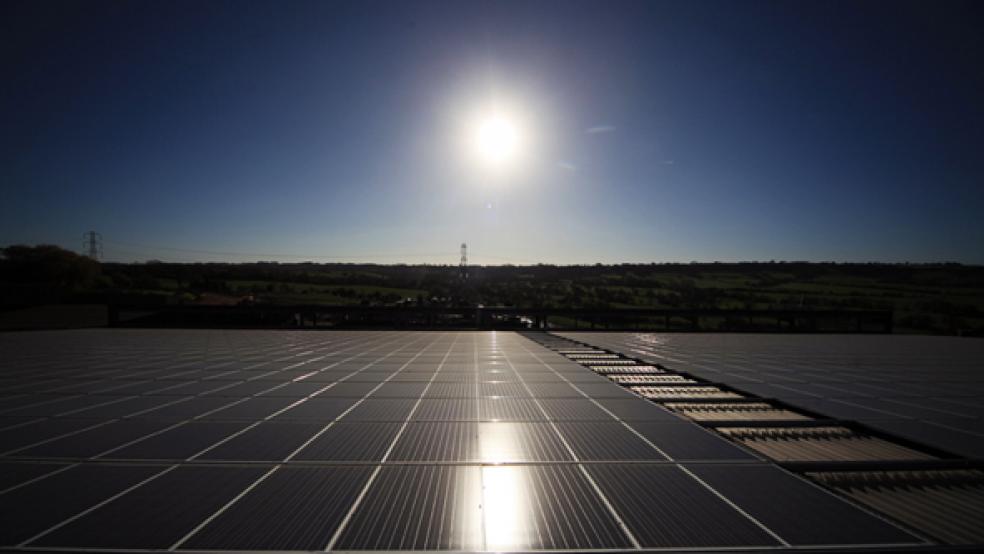In concluding a four-year investigation into the controversy surrounding the Obama administration’s mishandling of a loan guarantee to a California solar panel company that ultimately cost taxpayers $500 million, the Energy Department’s Inspector General blamed Solyndra executives for a mass deception that hid the company’s troubled finances and low growth potential.
The report released on Thursday said Solyndra officials repeatedly mislead the government and independent experts brought in to examine the books. It called their conduct at best “reckless and irresponsible” and at worst intentionally misleading.
Related: Solyndra Collapse Threatens Clean Energy
But the report also found that the Energy Department and other administration officials had been slipshod in overseeing the contract, missing numerous opportunities to uncover the company’s deceptive actions.
The latest findings revive the sorry saga of Solyndra, a low point in the early days of the Obama administration. Obama was blasted by Republicans for what they viewed as crony capitalism and political favoritism that cost the public dearly. The scandal also provides a cautionary tale for the president and his successor about the risks of managing large, multibillion-dollar energy initiatives without sweating the details.
Obama repeatedly cited the government loan guarantee to Solyndra as the first major step in his initiative to wean the economy off of its dependence on fossil fuels and turn to alternative sources of energy, including solar power and wind. While visiting its plant in May 2010, Obama declared that Solyndra was “leading the way toward a brighter and more prosperous future.”
Related: Obama Clean Tech Money Goes to Political Cronies
But the government was left holding the bag after the company laid off 1,100 workers and filed for bankruptcy in September 2011. Republicans launched investigations. And it was subsequently revealed that Office of Management and Budget officials felt pressured to approve the loan, despite concerns about Solyndra’s financial stability.
According to the IG’s report, Solyndra’s leaders engaged in a systematic pattern of lying and deception to paint their company’s financial situation in the most positive light while hiding crucial information that might have prevented them from qualifying for the first highly coveted clean-energy loan under a program designed to spend as much as $40 billion.
“Our investigation confirmed that during the loan guarantee application process and while drawing down loan proceeds, Solyndra provided the Department with statements, assertions, and certifications that were inaccurate and misleading, misrepresented known facts, and, in some instances, omitted information that was highly relevant to key decisions in the process to award and execute the $535 million loan guarantee,” the report concluded. “In our view, the investigative record suggests that the actions of certain Solyndra officials were, at best, reckless and irresponsible or, at worst, an orchestrated effort to knowingly and intentionally deceive and mislead the Department.”
The company’s efforts to hide the true state of its finances included overstating by 20 percent to 65 percent its competitive advantage over rival companies, misleading an independent engineering firm brought in by the government to assess Solyndra’s share of the solar panel market and deceiving Fitch Ratings service, which was retained to check out the firm’s credit.
Related: Solyndra Went on a Spending Spree After Getting Loan
The Justice Department decided earlier this year not to prosecute the former officials of the now-defunct company, according to The Washington Post, which first reported on the Inspector General’s findings.
Miles Ehrlich, a lawyer for founder and former Solyndra CEO Chris Gronet and former Chief Financial Officer Bill Stover told the Post that his clients and other former company executives “were completely truthful and accurate” in characterizing the company’s financial picture to the Energy Department.
While the Inspector General’s report clearly holds Solyndra officials largely responsible for the debacle, it has harsh words for the Energy Department’s performance.
Related: Will Solyndra Taint Obama’s Clean Energy Record?
Here are just a few examples the report cited to illustrate Energy’s lack of due diligence:
- Solyndra sent an amendment to one of its sales contracts to an Energy Department consultant in June 2009. The amendment voided a solar-panel customer’s obligation to purchase other products in the future from Solyndra. The consultant never alerted the department about the contract amendment or its significance. Unbeknownst to the government, the contract was already coming unglued, and the customer wanted to make sure it would not be held liable for refusing to purchase additional panels.
- In August 2009, at the request of the agency, Solyndra furnished a spreadsheet that listed sales for the first two quarters of 2009 as well as an updated copy of the company’s financial plan. “The revised plan incorporated more conservative prices and lower yearly volumes than previous financial plans Solyndra submitted to the Department,” according to the IG’s report. “We found no evidence anyone at the Department recognized this critically important difference.”
- Roughly a week before Energy closed the deal on the loan to Solyndra, a government loan officer discovered a major discrepancy between the estimates of the company and the department’s Office of Energy Efficiency and Renewable Energy on the projected cost of installing rooftop solar systems. The government pegged the installation cost at $2.50 per watt in 2015, but the company was projecting the cost at $3.10 per watt–a substantial difference that would have a huge bearing on Solyndra’s future profits. According to the IG’s report, the loan officer sent three e-mails to two senior department loan officials sounding an alarm about the pricing issue, but no action was ever taken.





